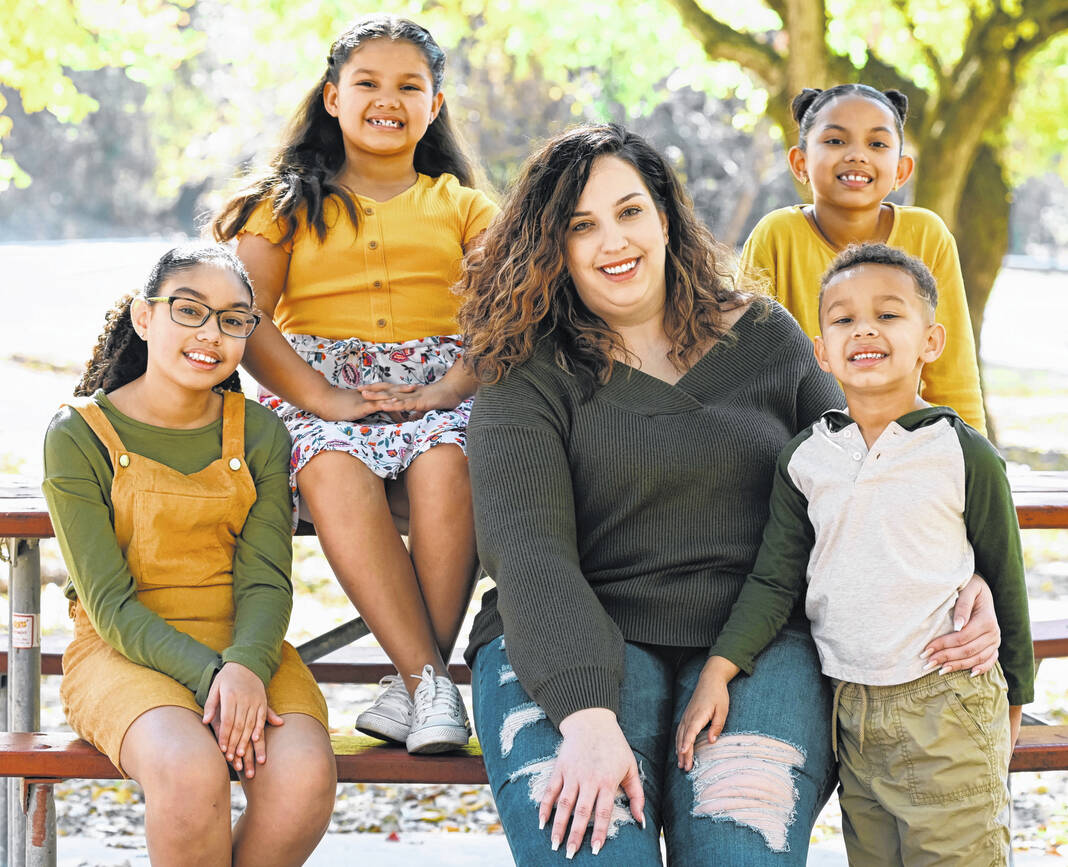

Rebecca with her four children.
Provided photo
By Vivian Blevins
Contributing Columnist
We all know families where fathers have hit the road, said “Adieu,” or simply disappeared — abandoning their families physically and/or emotionally. The reasons are varied, and I believe any one of us could list at least a half-dozen: infidelity, a fear of responsibility, narcissism, abusive relationships in the past with one or both parents, feelings of incompetence/inadequacy/unworthiness, immaturity, a feeling of being unnecessary except as a source of income, a loss of attraction for his partner, living in a society/culture/sub-culture that accepts such behaviors and/or sometimes portrays fathers as inept failures.
I must add that in much of the U.S. fathers are not adequately prepared for their paternal roles, and there is an absence of support from friends and family member. This is especially evident when a man observes the usual preparation for maternal roles: doctor’s visits, baby showers, sympathy and empathy for an expectant mother as her body displays obvious signs of pregnancy from morning sickness to expanded girth to the birth itself and recovery afterwards with everything from hemorrhoids to post-partum depression.
I recall knowing quite early that there would be no grandfathers in my life. My maternal grandfather died at age 39. When my father’s mother died when he was four years old, his father, John Bowlin, abandoned him and his three siblings. My brother’s research shows that Bowlin was married at least five times, maybe six. Did he abandon those wives and children as well?
Did my father, Caleb Powers Bowling, replicate his father’s behavior when times got tough? No, but I do recall the fear I felt when I was nine or so, and he came home one evening highly intoxicated and said to Mother, “I’m leaving. Pack my grip.”
Her response was, “Pack it yourself.” Within an hour he had fallen asleep and that was the end of that.
What happens to partners and children when fathers leave? I’ve communicated with three women, and I’d like to share a bit of their stories with you.
Rebecca, now 31, met the boy who was to become the father of her four children when they were both high school juniors, and a year after graduation she delivered their first child. That child is now 13, and the twin girls who followed are 9 and the youngest, a boy, is now 7. In 2017, her partner sent her a text at work, “I don’t want to do this family thing anymore. It’s holding me back.”
Her response was simply, “Okay.”
She had known since their third year together that she was in an abusive relationship, verbal, mental, and physical. Her husband had been brought up in a dysfunctional family and carried some of the behaviors he had learned there into their relationship. She was, however, terrified of being alone. Additionally, she had watched her grandparents and parents persevere and address the issues common to most couples, so giving up was unthinkable. With the text, however, she says, “I didn’t fight for him to stay, just packed up the kids and left.”
The couple opted for no lawyers, no court appearances, but when Rebecca sent a text indicating the areas they needed to consider together, his response was, “Figure it out your f***ing self.” And soon he had moved in with another woman and in 2020, he fathered two more children by two different women.
Payments for his child-support agreements for his four children with Rebecca range from 20- to 40-percent, depending on his circumstances. Further, he refused to download and accept an application that Rebecca completed which would allow him to be privy to his children’s schedules and clothing sizes. Additionally, he, according to an agreement they reached on child support in 2019, is to see his children every Thursday night, but that happens infrequently.
Rebecca realizes the importance of a father in the lives of their children, so she carefully monitors her communications with and about him. Rebecca reports that their son believes that his father is the coolest person in the whole world although he does wish that his father would take him to more games and be there for his games. She indicates that the twin daughters love their dad and dote on him. The oldest child, however, loves him, but expresses some disappointment and frustration. She believes his new baby gets all the attention, and she makes frequent comparisons and expresses a wish that “we all still lived at the same house.”
Housing for Rebecca and the four children is with her parents who have become like second parents, helping with issues such as picking up the kids from school, taking care of them when she travels for work and they are sick, attending special events, and as necessary helping with finances. Her grandmother and siblings live in the same city and are always available to help as well. Rebecca indicates, “My kids are in good hands, and I don’t need to worry about that.”
She works full-time in construction management and will compete her B.S. in computer science in December of 2024 with a degree and a career that she says “will provide a job that will allow me to take care of my kids.”
One of my college students this semester who prefers that I not use her name has a different story. After her father abandoned her mother, “a poor, single mother on welfare,” and her, her mom often had to take her to work with her at restaurants where she was working long hours seven days a week. She liked this because she wanted to be with her mother, and she also learned about hard work. When their electricity was cut off, her mother made it fun by pretending they were camping. She modeled honesty and integrity by returning extra change given her by mistake and by insisting that her children return found objects and complete the season, fulfilling their obligation to sports teams.
With her second pregnancy, she turned to her mother who encouraged her and taught her that she was a good mom with some bad days. When her brother died, her mother showed her and the family that in spite of the pain, it was essential that they get up every day and live life.
Currently, her mother models positive behavior by donating to women’s shelters and participating in food drives.
She is a licensed practical nurse and is employed in a healthcare facility for infants and children and is working to become a registered nurse.
Another of my students this semester is Hannah who reports, “All I am or ever will be, I owe to my mother.” She details the ways in which her mother has raised three daughters on her own without the help of their fathers. She indicates that her mother always demonstrates a “kind spirit” and lends a helping hand to her for items such as books and food. Hannah is now in a physical therapy assistant program because she wants to work directly with patients, helping them heal.
In conclusion, we need to strategize on more ways to provide programming to assist more men in navigating the reasons that prevent them from being effective fathers. All the fathers who are so successful in their roles will be the key in this initiative. Yes, we need competent mothers, but our children also need fathers to teach them to navigate life’s stressors, both small and gigantic, as they celebrate the joys of their relationships.
Vivian B. Blevins, past CEO of colleges in Kentucky, Texas, California, and Missouri, holds a Ph.D. from The Ohio State University. She currently writes a weekly column for Aim Media Midwest, teaches at Edison State Community College, and volunteers with veterans. Her email is [email protected]. Viewpoints expressed in the article are the work of the author. The Daily Advocate does not endorse these viewpoints nor the independent activities of the author.




